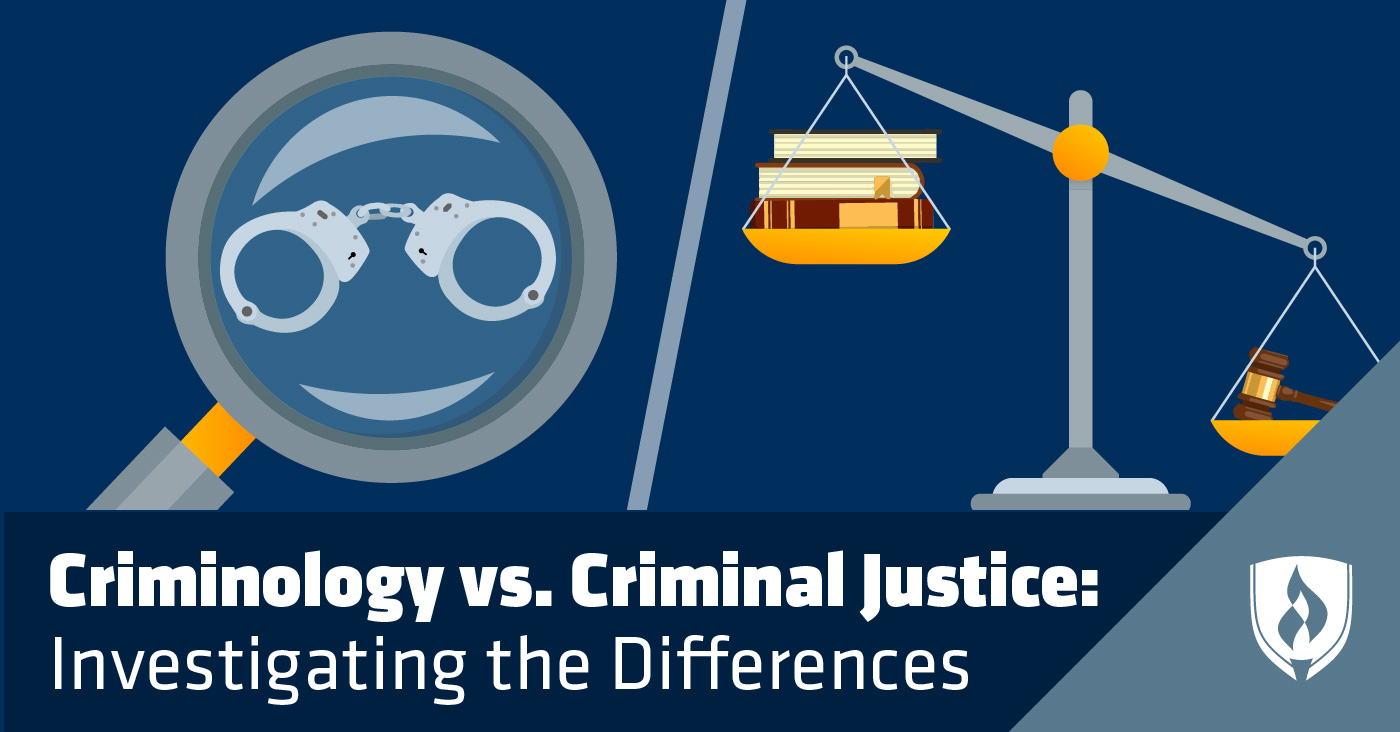
True crime is more than a fleeting interest for you. It’s a bit of an obsession. You may seem like just another passenger on the bus, but on your earphones you’re listening to the latest story about the motivation and prosecution of criminal acts. It’s not the blood and gore that gets you. You are interested in what happens when people are pushed to the extremes of human behavior and how a society recovers from those wounds.
Now that you’ve worked your way through every episode of My Favorite Murder, you’re ready to consider what it might mean to take your amateur knowledge of crime into the professional world. How can you become part of the fight against violence and abuse? What educational and professional goals could help you achieve the dream of a safer community for everyone?
Criminology and criminal justice might be familiar terms to you. But do you really know the difference? We spoke with experts in both fields to uncover the differences between these related yet commonly confused fields.
Criminology vs. criminal justice: Breaking down the basics
What is criminology?
Criminology is the scientific study of criminal behavior. This interdisciplinary field draws on both the behavioral and social sciences to explore the nature, causes, consequences and prevention of crime. Criminology is a field within sociology, the study of society and social behavior.
“Let me introduce you to the role of the criminologist: half academic, half detective,” says Darrin Giglio, Chief Investigator of North American Investigations. “To become a criminologist, more than anything else, you have to realize that you will be learning about a conglomerate of different sciences that range from Statistics to Thanatology (the scientific study of death) and Procedural Law—it is quite an eclectic field of knowledge.”
Giglio explains that the field can be boiled down to roughly five key disciplines—Criminal Law, Psychology, Sociology, Medicine and Anthropology.
“Applied in practice, the criminologist needs to learn and understand how criminal phenomena affect society as a whole: the crime itself, the causes and ways in which it is carried out, the offender, the victim and, of course, its prevention.”
What is criminal justice?
Criminal justice is a term that describes the formal process of delivering justice on individuals who have committed a crime. Criminal justice is a concrete field with direct impact on individuals and society.
This field refers to the institutions dealing with crime. That includes the police who detect crime, the jails detaining criminal suspects, the courts where criminal acts are prosecuted and the correctional facilities overseeing punishment. Much of the work of criminal justice professionals focuses on the application of what criminologists study in theory.
How does criminology differ from criminal justice?
“While criminology and criminal justice definitely overlap in some areas and complement each other in other areas, they have distinct differences,” says Rick Musson, police sergeant and law enforcement consultant with USInsuranceAgents.com. “Criminology seeks to find the ‘Why?’ Criminal justice deals with the ‘What?’.”
He explains criminology deals more with the theory of why people behave the way they do by gathering the available pieces of information and analyzing it.
“Criminal justice deals more with the immediate cause and effect,” says Musson.
Criminology vs. criminal justice: The career paths
Criminology careers
Criminologists work in a wide variety of settings including colleges and universities, public policy organizations, and legislative bodies. These professionals draw on their deep understanding of criminality to make a positive impact on communities.
“Criminology is more related to the academic field rather than with law enforcement, as most criminologists are lecturers and researchers,” says Giglio. “With the knowledge gained, criminologists aim to improve security policies and make communities safer.”
Studying criminology can also serve as the foundation for building a career in law enforcement.
“I originally began my undergraduate work with the goal of getting a degree in criminal justice. It wasn’t until my junior year that I made the choice to shift my studies and change my major to criminology,” says Paul Grattan, a criminologist, supervisor with a large metropolitan police department, and a Policing Fellow with the National Police Foundations.
Gratton notes that for those focused on a law enforcement career path, a degree focused on studying either subject can be seen as a plus as most agencies welcome qualified applicants of all educational backgrounds. It should be noted that earning a degree in either of these fields doesn’t necessarily qualify you for law enforcement work—each state sets their own standards for training and preparation.
Criminal justice careers
Careers in criminal justice include all areas of law enforcement (such as police, correctional, and probation officers), as well as the courts (including judges, prosecutors, and defense attorneys). Individuals with a background in criminal justice also have the opportunity to work in the private sector—for example, as private investigators and security professionals.
“I studied and received a bachelor's degree in Criminal Justice from St. John’s University,” explains Giglio. “Prior to deciding what career path to take I was interested in law enforcement on the federal level, and I was lucky enough to have been recruited from my university into the United States Secret Service. After contemplating where I wanted to see myself in the future I ended opting for the private sector and became a private investigator.”
Criminology vs. criminal justice: The training
Because of the academic nature of criminology, most criminologists have pursued advanced degrees within criminology or other social sciences. Training for a criminologist is part of their educational experience taking coursework and conducting research in the field. According to the Bureau of Labor Statistics, criminologists (a variant of sociologists) often hold a master’s degree or a PhD.1
A degree in Criminal Justice can be an asset in a variety of meaningful professions—all with unique training requirements and opportunities. For some career paths, like becoming an attorney or prosecutor, a Criminal Justice bachelor’s degree can be an excellent foundation to build upon. For law enforcement roles, a Criminal Justice degree can be used to supplement your qualifications once you’ve met state-approved training criteria.2
“Studying Criminal Justice gave me the foundation and motivation to continue pursuing a career in investigations,” says Giglio.
Interested in learning more?
You’ve now scratched the surface of the fields of criminology and criminal justice. If you are interested in learning more about the career opportunities that will allow you to make meaningful change in the safety of your community take a moment to read our article, “8 Criminal Justice Careers for Those Who Don’t Want to Be Police Officers.”
Related Articles:
1Bureau of Labor Statistics, U.S. Department of Labor, Occupational Outlook Handbook, [accessed May, 2020] www.bls.gov/ooh/. Information represents national, averaged data for the occupations listed and includes workers at all levels of education and experience. This data does not represent starting salaries. Employment conditions in your area may vary.
2The Criminal Justice Leadership and Management Bachelor’s degree and Criminal Justice Associate’s degree programs have not been approved by any state professional licensing body, and the programs do not lead to any state-issued professional license. For further information on professional licensing requirements, please contact the appropriate board or agency in your state of residence. Additional education, training, experience, and/or other eligibility criteria may apply.
In Minnesota, the Criminal Justice Associate’s degree program does not meet the standards established by the Minnesota Peace Officer Standards and Training Board for persons who seek employment as a peace officer.




